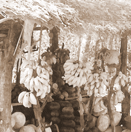| |
Preparation of the 2009 – 2013 Country Strategic Opportunities Paper (COSOP)
Client: International Fund for Agricultural Development (IFAD)
Duration: September 2008 to August 2009
CEPA won a competitive bid to put together the Country Strategic Opportunities Paper for IFAD, which will provide strategic direction for the organisation’s programming in Sri Lanka for the period of 2009 – 2013. CEPA’s work keep encountering the conundrums in domestic agriculture and this opportunity to study the sector more systematically was very welcome. There was also a strong professional interest from the agriculture-graduates in the CEPA team. CEPA had conceptualised the assignment as a networked research activity with researchers and stakeholders in iterative dialogue with each other in the process of developing the COSOP but limitations in the budget and the formulaic approach to agriculture by many stakeholders somewhat constrained the process. Six background papers were written, four by CEPA staff members and two by external consultants. The papers were titled Rural Economy, Rural Factor Markets, Environment and Climate Change, Rural Institutions, Micro Finance, and Remittances and Migration. The strategic conclusions from these papers were discussed with central government and non-government stakeholders as well as those from the Uva, Sabaragamuwa and Central provinces. This dialogue will continue into 2009 to align IFAD’s intended interventions with the government’s development framework and the changing context in the country. It is hoped that the papers can be published in collaboration with IFAD.


Stakeholder Mapping of Current Climate Change Activities in Sri Lanka
Client: Practical Action - South Asia
Duration: February to April 2008
CEPA undertook an assignment for Practical Action, an international NGO with a long term presence in Sri Lanka, to map the current stakeholder landscape of organisations addressing climate change-related activities in the country. This study was aimed at assisting Practical Action to determine stakeholder interests and identify networks towards taking appropriate
2008
steps to tackle these issues through their spectrum of work. It gave CEPA an opportunity to develop an understanding of how climate change is being perceived and acted upon in a range of organisations in Sri Lanka.
 
Pilot Project for Monitoring the Impact of Corporate Social Responsibility (CSR) Efforts in the Sri Lankan Private Sector
Supported by International Alert (AI)
Duration: January to June 2008
The recent years have seen a growth in momentum of Corporate Social Responsibility (CSR) activities in the Sri Lankan corporate sector. Having received a huge boost in its successful engagement during the 2004 tsunami, the private sector is engaging ever more proactively and creatively in what was traditionally a domain of the government, donor agencies and other development agencies. There is a great deal of recognition of the resources that could be put into CSR and the potential social changes this may cause. There is also a debate about appreciating the good that companies do as a result of their CSR as well as concern about the need to change the way they conduct their core businesses. Encouraging companies to think about their business practices as well as their CSR initiatives that can result with greater impacts to the society is at the heart of this engagement.
Against this background, International Alert (IA) and CEPA collaborated on an initiative that had as its long term goal, the development of methods and tools for monitoring, through which the private sector companies can assess the wider social and economic impact of their CSR efforts. An exploratory study looking at five companies to better understand their approach and implementation towards CSR was carried out by Azra Jafferjee (CEPA Associate) with two CEPA staff members. This was aimed at laying the foundations for developing a monitoring method and to translate the lessons learned into guidelines that can be shared and applied by other companies.


CEPA Collaboration with CARE Sri Lanka on the Plantation Sector Programme Strategy Development
Client: CARE Sri Lanka
Duration: October 2008 to September 2009
CARE Sri Lanka and CEPA have established an agreement with the aim of enhancing the learning and capacity in both organisations to meet their organisational goals. Under this partnership, CEPA will provide strategic development and monitoring and evaluation advice for CARE’s programmes centred around the development of a programme framework for CARE’s plantation sector work in the future. This assignment has offered CEPA an opportunity to integrate into the sector the learning from the study on moving out of poverty in estates (see CEPA publications The Estate Worker’s Dilemma).
|
